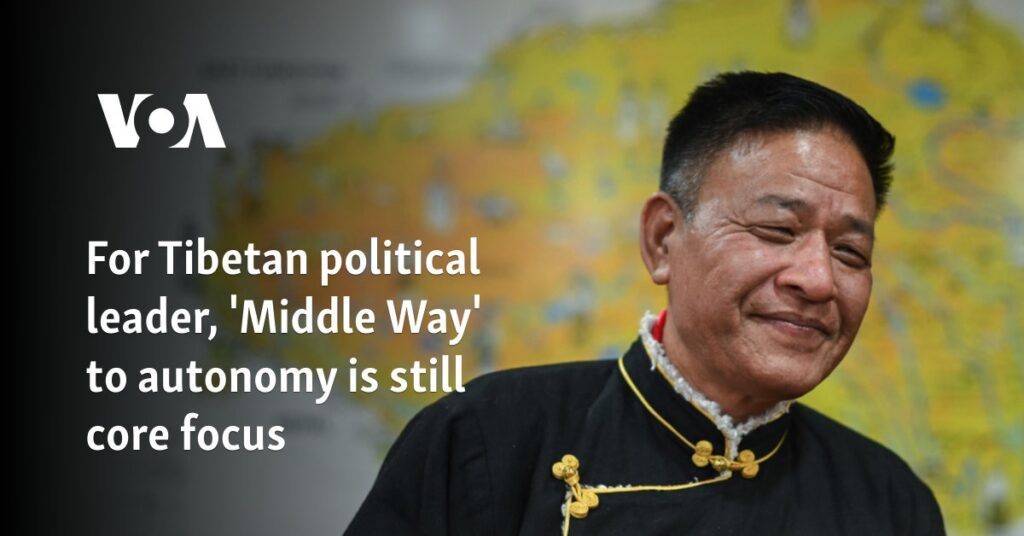Prague/Washington —
In the lobby of a luxury hotel in Prague, Sikyong Pengpa Tsering spoke about death, particularly the contingency that China’s Xi Jinping would someday die.
“Nothing is permanent. Even our lives are not permanent. We are born and must die. Therefore, even empires rise and fall. Governments also rise and fall. Xi Jinping must also die. Therefore, these are inevitable.” Tsering, leader of the Tibetan government-in-exile, Central Tibetan Administration.
He said it casually and matter-of-factly, as if he were not talking about the potential collapse of the world’s second-most powerful government and the inevitable death of its powerful leader.
“China is going to change. It has to change. There is no other choice,” Tsering told VOA on the sidelines of the Forum 2000 Democracy Conference in the Czech capital Prague last week.
Sitting in a leather chair, wearing a black Tibetan vest and a blue button-down shirt, Tsering talked about how the fundamental Buddhist idea of impermanence gives him hope for his homeland.
Central Tibetan Administration political leader Sikyong Pengpa Tsering (left) speaks with VOA reporter Liam Scott on the sidelines of the Forum 2000 Democracy Conference in Prague on October 13, 2024.
Reports say abuse is on the rise
China annexed Tibet in 1950, and human rights abuses in the region have steadily increased since then, according to a report by the U.S. State Department and human rights groups.
The Chinese government claims the region has been part of China since “ancient times.” The government considers the Central Tibetan Administration (CTA) a separatist organization and says no government should allow visits by the Dalai Lama, Tibet’s spiritual and former political leader.
But for Tsering, under the Buddhist view of impermanence, everything in life is fleeting, even the power and oppression of Beijing.
Tsering is full of hope, but so is his realism. Prospects for improved human rights conditions and greater autonomy remain remote. Tsering said it doesn’t help that the CTA and the Chinese government have few open communication channels.
“Even if we were able to re-establish contact, there is no chance that anything would actually come of it,” Tsering said. For now, the backchannel dialogue is not short-term but long-term, the democratically elected leader added.
However, in an ideal world where the Chinese government was actively involved in the CTA, one of the top priorities would be human rights in Tibet and a middle-way approach, i.e. giving the region greater autonomy while still being part of Tibet. It would be Tibetan administrative policy. China.
These were among the issues that Celin sought to raise with political and civil society leaders at Forum 2000, an annual gathering on human rights issues in democracies founded by former Czech President Václav Havel. be.
Advocating the “middle way”
Tsering is based in India but frequently travels the world to advocate for the Tibetan people. But he has a special affinity for the Czech Republic and other European countries that once suffered under communism.
“They are going through what our people are going through right now,” Tsering said. “That makes it easier for them to understand.”
Tsering has about a year and a half left in his five-year term. He has not yet decided whether to pursue a second term, but said one of his priorities for the next 18 months will be to advocate for a middle-of-the-road approach.
The Middle Way approach accepts Tibet’s status as part of China, but advocates greater autonomy, including greater religious, linguistic, and cultural freedom. This is an attempt to balance Beijing’s concerns about Tibetan separatism with Tibetans’ concerns about cultural preservation.
Tsering said he was unsure why the Chinese government seemed so opposed to this approach, since it does not call for independence.
“We are dying a slow cultural death.”
For years, media and human rights organization reports have detailed the Chinese government’s gross rights violations in Tibet.
According to the Tibetan Center for Human Rights and Democracy, Chinese authorities have particularly suppressed signs of Tibetan dissent in the region, and more than 5,600 former or current political prisoners have been imprisoned in Tibet since 1990.
The expression of Tibetan Buddhism and Tibetan cultural identity is also restricted.
“We are dying a slow cultural death because China is squeezing the breath out of us like a python, slowly but surely squeezing the breath out of us,” Tsering said. Ta.
Authorities have suppressed the use of the Tibetan language, and the United Nations estimates that around 1 million children have been forcibly separated from their families and sent to state-run boarding schools to assimilate into the dominant Han culture. are.
“It’s clear that the Chinese government is essentially hollowing out and erasing Tibetan identity,” Sophie Richardson, a visiting scholar at Stanford University and former China director at Human Rights Watch, told VOA. spoke.
China’s Ministry of Foreign Affairs did not respond to VOA’s email requesting comment on this story.
Other human rights issues include the Chinese government’s harassment of exiled Tibetan journalists and activists in a process known as cross-border repression.
“This is essentially to prevent anyone from hearing a different version of their story or from hearing criticism of their version. The Chinese government has made sure that everyone believes China’s version of history. We want it,” Richardson said.
But when it comes to cross-border repression, Tsering said he was not a target.
“They don’t threaten me because they know it’s pointless. I don’t listen. If they threatened me, I’d be worse,” Tsering said. . “If they tell me not to do something, I do it even more because I know it will hurt them.”

